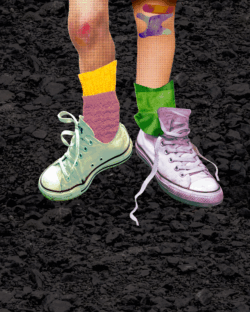My mom sends me DMs on Instagram as if she were a teenage girl, filling my notifications with photos and slideshows of cute animals, people falling down the stairs, and new and noteworthy DC restaurants to try. She loves WeRateDogs, an account that shares and ranks dogs submitted by followers—each dog receives, bare minimum, a 12/10—and she always gets a laugh out of posts by MomsBehavingBadly. But her favorite account is Good News Movement, a self-proclaimed “Journalist-run, good news only page” that seeks to share stories of joy and triumph (these posts are usually inspiring enough to make the family group chat).
Our world is chaotic, there’s no doubt about it, and it’s reflected in the news we see and read every day. The New York Times, The Washington Post, and NPR all blast headlines detailing the economic turmoil sparked by the Silicon Valley Bank crash, updates on the war between Russia and Ukraine, and the ever-escalating conflict in Israel and Palestine. The sheer volume of negative stories has conditioned us to believe that the vast majority of important news must be inherently depressing. We continue to read these stories in an attempt to stay informed about what’s happening around us, but this “doomscrolling” can cause an onset of anxiety that may discourage us from keeping up with world events at all.
The Good News Movement, instead, seeks to break up this barrage of stress-inducing content with endearing videos and photos of children expressing their love for their grandparents and undercovered, light-hearted news stories. And these more heartwarming articles are certainly in demand—the account now boasts over 4.7 million followers, and the comments are typically littered with individuals joking that “they didn’t plan on crying today.” In the mainstream, various media companies, like TODAY and the Huffington Post, now dedicate specific sections of their websites to sharing good news stories. Especially since the beginning of the pandemic, people have developed a strong desire to consume uplifting news, to receive a small reminder that our world is still on the right track.
However, organizations and accounts dedicated to sharing good news have subconsciously desensitized us readers to the existence of systemic problems in our society. To be fair, many of the stories these organizations share are exciting, including drastic price cuts on commonly prescribed forms of insulin and the first man with cerebral palsy to finish a marathon. Yet, interspersed between these truly inspiring stories also lie stories that commend the goodness of individuals who overcame great difficulties or provided care to others without bothering to analyze severe underlying issues.
For instance, 65-year-old Detroit resident Diane Gordon is an elderly woman who worked to return $15,000 cash to a couple to which it belonged. Good News Movement reports that, since a broken car left Gordon to walk three miles to work every day, a local car dealership rewarded her honesty with a new Toyota, and a GoFundMe raised over $80,000 on her behalf. However, the story ignores the chronic lack of accessible and well-functioning public transportation systems outside of major metropolitan cities. Nor does it account for the inaccessibility of appliances like cars that have become practically necessary to commute long distances.
The account also recently published a story about 80-year-old James Gailey. Gailey, a Texas high school janitor, was forced out of retirement in order to pay his rising rent. In response, his students and other supporters raised over $90,000 to allow him to retire permanently. For Gailey and many others, retirement has become practically impossible in the country’s current economic climate. Citizens Bank recommends that you should save between 10 to 12 times your annual income at retirement age or join the “millions club” and set aside between $1 to 1.5 million. The ability to earn this amount of money is inaccessible to the majority of the population due to structural barriers surrounding race, class, and gender. Not to mention, Gailey was forced to continue working due to rapidly increasing housing prices in a society where affordable housing options are already few and far between.
These articles are just a snapshot of the hundreds if not thousands of pieces that reflect similar, problematic sentiments. Heartwarming news articles neglect these deep-rooted systemic problems, praising reactionary actors and short-term, small-scale solutions instead of meaningfully interrogating how these problems came to be in the first place.
Capitalism posits that working hard naturally leads to success, but this is a myth. Race, class, and other structural barriers make it difficult for marginalized communities to attain success, even with hard work. Such inequalities have become so commonplace that blatant instances of classism and other forms of bigotry no longer faze us. We are effectively brainwashed to believe that we must live within the current systems in place. Positive news unwittingly celebrates these systems, often applauding the actions of charitable middle and lower-class individuals who manage to “make it out” as a result of their supposed upstanding moral character. This type of news has also blinded readers to the effect of said systems—top comments commend community fundraising and cheer that “together, we can!” while ignoring sweeping issues that could be alleviated by critical structural change.
I don’t think it necessarily has to be this way. Prominent news organizations must begin by reframing the way that they share positive news, including a call to action that works to mitigate the root issue. James Gailey is not the first person to struggle with housing inequity, and he certainly will not be the last; thus, it is our moral imperative to cover such stories with empathy and radical imagination. In doing so, we can hopefully reduce the number of those in need in the future. But we must do more than simply bring attention to these issues. Participation in micro-level community efforts is important for helping specific individuals. However, we must also strive to produce overarching changes to the systems that engender “positive” news stories through concentrated, collective advocacy. This way, we can work to mitigate the need for this genre of seemingly happy news altogether.
Surrounded by overwhelming headline news and perhaps equally depressing “heartwarming” news, I also encourage us all to find joy in the in-between. There are small moments of real happiness that happen to all of us each day, and truly exciting developments going on in the world! Pharmaceutical company Eli Lilly recently announced that they would cap what patients pay out-of-pocket for insulin at $35, a 70% decrease in price, making life-saving medicine more widely accessible. Less striking but still joyful, a man spent his winter upcycling old coolers into cat shelters. Good things are happening, and we must seek them out and work to create more instances of authentic joy in our lives and in the world.






